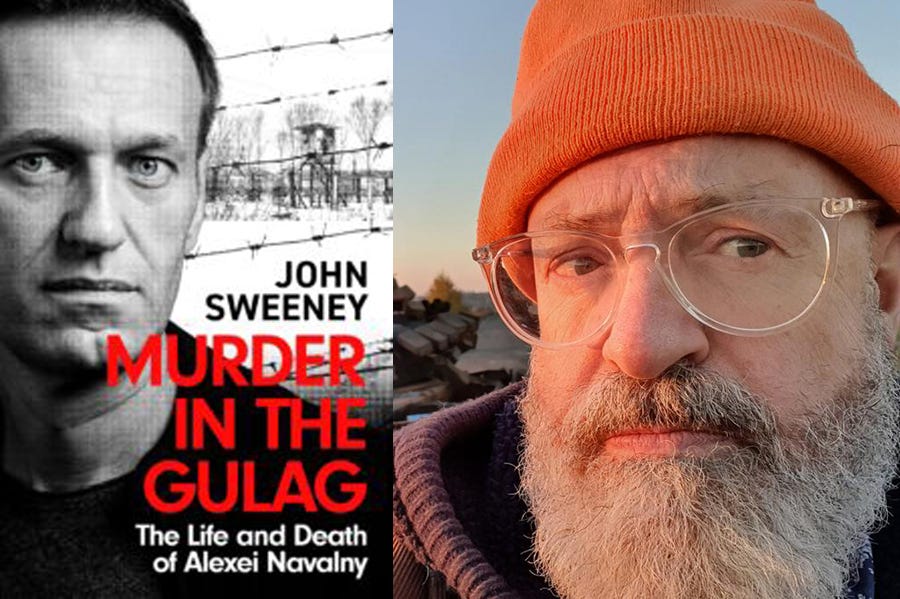Murder in the Gulag

I rarely re-post other authors’ work, but Chris Schuler’s excellent summary of John Sweeney’s recent talk at the Authors’ Club deserves a wide audience. Why break my own rules? Well, I was there, and I couldn’t have put it better myself.
In Chris’s words;
Last week at the National Liberal Club in London, the veteran investigative journalist and author John Sweeney addressed a packed audience of Authors’ Club and NLC Ukrainian Circle members about his latest book, Murder in the Gulag: The Life and Death of Alexei Navalny, a frank, unvarnished portrayal of the charismatic but controversial Russian opposition leader who was murdered in an Arctic penal camp last February at the age of 47.
After he was introduced by Lucy Popescu, chair of the Authors’ Club, Sweeney pulled on the trademark orange beanie familiar to viewers of his video dispatches from Ukraine, which invariably begin ‘Day XXX of Vladimir Putin’s war on Ukraine,’ and sign off with ‘Vladimir Putin, do f— off.’ The four-letter expletive can rarely have resounded through the hallowed vaults of the National Liberal Club quite as often as it did in the course of his talk.
Early this year, Sweeney slipped on ice in Kyiv – where he still lives part time – and heard of Navalny’s death from his hospital bed. He knew the man personally, having met and interviewed him, and was deeply affected by the news. ‘He was a hero to me,’ Sweeney said, ‘tall, blond, blue-eyed, humorous and intensely charismatic,’ but also, he added, ‘an arrogant prick – but then you have to be to go against Putin.
‘I’ve met four Russians who challenged Putin: Anna Politkovskaya, Natalya Estemirova, Boris Nemtsov, and Navalny. In order, poisoned then shot, shot, shot, poisoned, now murdered’ – a reign of terror chronicled in Sweeney’s previous book, Killer in the Kremlin (Bantam Press, 2022).
‘Putin uses money and sex and terror to shut people up and stay in power. It didn’t work with Navalny – he wasn’t tempted by money, he had an amazing marriage to Yulia, and he was unafraid.’ People often wondered why Navalny returned to Russia from Germany after being poisoned with Novichok in August 2020. ‘In politics you have to be a risk-taker,’ Sweeney explained, ‘and he was a devout Christian, whose belief in the afterlife sustained him.’
Navalny’s opposition to Putin’s regime, Sweeney explained, sprang from his childhood. Although he was born in the Moscow region, his father was Ukrainian, and his grandparents still lived there, not far from Chernobyl, where the young Navalny spent many summers. After the nuclear disaster in 1987, his grandparents were evacuated, never to return. His childhood idyll had been taken from him by Soviet corruption and stupidity, and he soon detected the same mindset in Putin’s United Russia Party – ‘a party of crooks and thieves’, he called it.
Despite his admiration for Navalny, Sweeney did not shy away from the man’s flaws. Having joined Grigory Yavlinsky’s liberal party Yabloko, Navalny became disillusioned after they were intimidated into ‘managed opposition’, and was drawn instead to the energy of the far-right Russian nationalists. Although he later dissociated himself from them, it was, Sweeney remarked, ‘a tactical and moral mistake for which he never apologised’.
Taking questions at the end, in the week that President Biden authorised Ukraine to use US-supplied ATACMs against military targets inside Russia, and Putin threatened reprisals, Sweeney was asked if he was worried about escalation.
‘When Putin first threatened nuclear retaliation in September 2022, I was worried,’ Sweeney said. ‘But the following week, at the summit in Samarkand, Xi Jinping said there must be no nuclear adventurism. China’s economy is in a mess, and they need the West to keep buying their goods. If Putin disobeys, Xi will kill him.’
Murder in the Gulag: The Life and Death of Alexei Navalny, by John Sweeney (Headline Press, 2024). Amazon link here.
You’ll find this and other articles by Chris Schuler on Substack here.